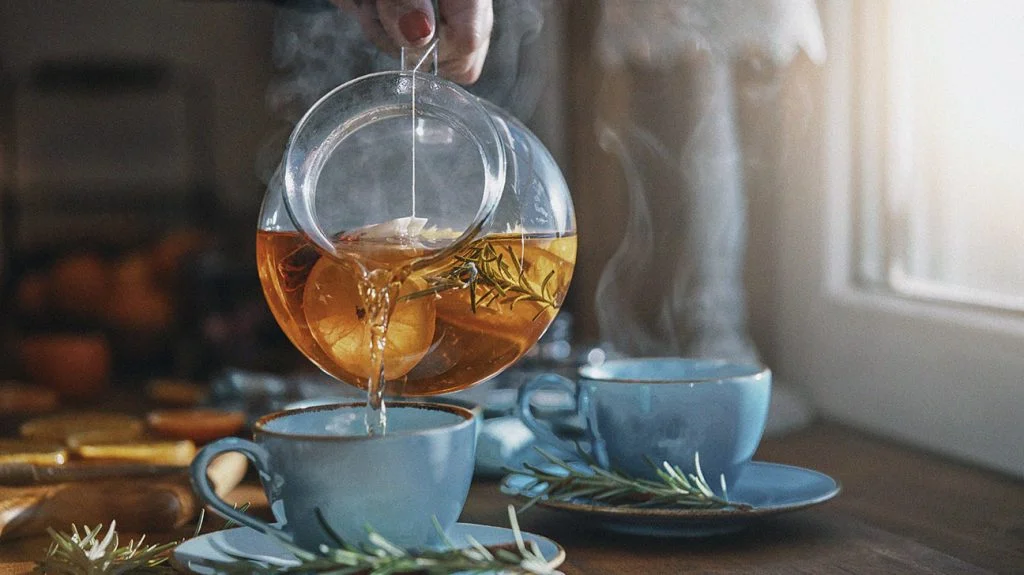Blog
Discover the Best Herbal Teas for Relaxation
Herbal teas have been cherished for centuries, not just for their soothing flavors but also for their therapeutic benefits. When it comes to relaxation, there’s no better way to unwind after a long day than by sipping on a warm cup of herbal tea. These caffeine-free options offer a wide range of calming properties that can help reduce stress, promote better sleep, and enhance overall well-being. In this guide, we’ll explore the best herbal teas for relaxation and how they can help you feel at ease.
1. Chamomile Tea – The Classic Relaxant
Chamomile tea is perhaps the most well-known herbal tea for relaxation. This gentle, soothing beverage is made from the dried flowers of the chamomile plant and is often used for its calming properties. Chamomile is particularly effective in relieving stress, anxiety, and promoting better sleep.
- Benefits: Chamomile has mild sedative effects, making it ideal for winding down before bedtime. It helps to ease tension, reduce insomnia, and calm the nervous system.
- How it works: Chamomile contains an antioxidant called apigenin that binds to receptors in the brain, promoting relaxation and helping to reduce anxiety.
Tip: Drink chamomile tea about 30 minutes before bed for optimal relaxation and sleep quality.

2. Lavender Tea – A Floral Escape
Lavender is another popular herb known for its calming and relaxing properties. Lavender tea, made from the flowers of the lavender plant, is often used to reduce anxiety, alleviate stress, and promote a sense of peace. Its light floral aroma and delicate flavor make it a perfect choice for unwinding after a busy day.
- Benefits: Lavender tea helps reduce anxiety, improve sleep quality, and relax the mind and body. It’s also known for its mild mood-enhancing properties, which can help with mild depression and restlessness.
- How it works: The scent and compounds in lavender have been shown to stimulate the parasympathetic nervous system, which is responsible for relaxation.
Tip: For an even more soothing experience, add a few drops of lavender essential oil to your tea ritual for added relaxation.

3. Peppermint Tea – Refreshing and Calming
Peppermint tea is another excellent choice for relaxation. While peppermint is often associated with energy-boosting properties, it also offers a variety of benefits that promote calmness and mental clarity. The cooling sensation of peppermint helps soothe both the body and the mind.
- Benefits: Peppermint tea helps to relieve tension headaches, digestive discomfort, and muscle aches. It also promotes relaxation by soothing the digestive system and alleviating stress-related tension.
- How it works: Menthol, the primary compound in peppermint, has a calming effect on the muscles and can help reduce anxiety by relaxing the nervous system.
Tip: Drink peppermint tea after a meal to aid digestion or sip it when you need a calm, refreshing moment of relaxation.
4. Lemon Balm Tea – Stress-Reliever Extraordinaire
Lemon balm, a member of the mint family, is known for its calming, anti-anxiety properties. Lemon balm tea has a mild, lemony flavor with a hint of mint, making it an incredibly refreshing and soothing beverage. It’s perfect for calming the nerves and reducing stress.
- Benefits: Lemon balm tea is effective in reducing anxiety, promoting a sense of calm, and improving mood. It also supports better sleep by reducing restlessness and nervousness.
- How it works: The compounds in lemon balm, particularly rosmarinic acid, have been shown to increase the levels of GABA (a neurotransmitter) in the brain, which promotes relaxation and stress relief.
Tip: Combine lemon balm tea with a small amount of honey for a delicious, calming treat.
5. Valerian Root Tea – For Deep Relaxation
Valerian root has been used for centuries as a natural remedy for sleep and anxiety. While it has a strong, earthy flavor, valerian root tea is highly effective in promoting deep relaxation and improving sleep quality. It is especially useful for those who suffer from insomnia or anxiety-related sleep disturbances.
- Benefits: Valerian root is known for its sedative properties, helping to reduce anxiety, promote restful sleep, and calm nervous tension. It is a great option for those who need a more potent herbal remedy for relaxation.
- How it works: Valerian root works by increasing the levels of GABA in the brain, which helps relax the nervous system and promote a feeling of tranquility.
Tip: Drink valerian root tea about an hour before bed to ensure a peaceful night’s sleep.
6. Passionflower Tea – A Natural Sedative
Passionflower is an herb known for its relaxing effects, especially when it comes to reducing anxiety and promoting better sleep. Passionflower tea has a mild, slightly floral flavor and is often used as a natural remedy for nervousness and insomnia.
- Benefits: Passionflower tea helps to reduce anxiety, calm the mind, and induce sleep. It is especially helpful for those who suffer from occasional restlessness or have trouble falling asleep.
- How it works: Passionflower contains compounds that enhance GABA activity in the brain, making it an effective tool for managing stress and promoting relaxation.
Tip: Combine passionflower tea with other calming herbs like chamomile or lavender for an even more potent relaxation effect.
7. Rooibos Tea – Antioxidant-Rich Relaxation
Rooibos tea is made from the leaves of the South African rooibos plant and has become increasingly popular for its health benefits and naturally caffeine-free properties. While it is often used for its antioxidant content, rooibos also offers gentle calming effects, making it a great choice for relaxation.
- Benefits: Rooibos tea is rich in antioxidants and minerals that help to reduce stress and promote overall well-being. It has anti-inflammatory properties that help calm the body and mind, making it ideal for relaxation.
- How it works: The flavonoids in rooibos, such as aspalathin, help relax the nervous system, while its magnesium content supports muscle relaxation.
Tip: Rooibos tea is naturally sweet, so it can be enjoyed without added sugar. It’s perfect for sipping before bed.
8. Green Tea – A Gentle Relaxer with Antioxidants
While green tea contains a small amount of caffeine, it also has L-theanine, an amino acid known for its relaxing properties. This combination of mild caffeine and relaxing L-theanine makes green tea a perfect beverage for daytime relaxation.
- Benefits: Green tea helps reduce stress and improve focus while providing a calming effect. It also offers a boost of antioxidants to support your overall health.
- How it works: L-theanine helps increase serotonin and dopamine levels in the brain, which can improve mood and relaxation without making you feel drowsy.
Tip: Enjoy green tea during the afternoon as a way to stay calm and focused without disrupting your sleep later on.
Conclusion
Herbal teas are an excellent natural remedy for relaxation, offering a wide variety of options to suit your tastes and needs. Whether you’re looking to calm your nerves after a stressful day, promote a restful night’s sleep, or simply unwind, these herbal teas can help you achieve a state of tranquility. From the calming effects of chamomile to the deep relaxation induced by valerian root, each herbal tea brings its unique benefits to enhance your relaxation routine. So brew yourself a cup, sit back, and let the soothing properties of these teas bring peace to your mind and body.


